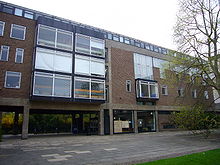- Marshall Library of Economics
-
The Marshall Library of Economics at Cambridge University is the outgrowth of a Moral Sciences Library begun in 1885 by Professor Alfred Marshall and Professor Henry Sidgwick, consisting largely of their own books and housed in the School of Divinity.
Upon his death in 1924, Professor Marshall bequeathed much of his personal library to Cambridge. In his honour, the expanded collection was named "The Marshall Library of Economics", and moved to larger quarters on Downing Street. In 1935, it took over the former Squire Law Library, and in the early 1960s relocated once again to its present home in Sidgwick Avenue.
External links
University of Cambridge 
Chancellor: The Lord Sainsbury of Turville (list) · Vice-Chancellor: Sir Leszek Borysiewicz (list)
Colleges: Christ’s • Churchill • Clare • Clare Hall • Corpus Christi • Darwin • Downing • Emmanuel • Fitzwilliam • Girton • Gonville and Caius • Homerton • Hughes Hall • Jesus • King’s • Lucy Cavendish • Magdalene • Murray Edwards (New Hall) • Newnham • Pembroke • Peterhouse • Queens’ • Robinson • St Catharine’s • St Edmund’s • St John’s • Selwyn • Sidney Sussex • Trinity • Trinity Hall • Wolfson
Categories: University • Chancellors • Vice-Chancellors • Colleges • Heads of Colleges • Departments • Academics • Alumni • Awards and Prizes
Websites: University • Students’ Union • Graduate Union

Coordinates: 52°12′03″N 0°06′32″E / 52.200789°N 0.108985°E
Categories:- Library and information science stubs
- 1924 establishments in England
- Libraries of the University of Cambridge
- Economics publications
Wikimedia Foundation. 2010.

